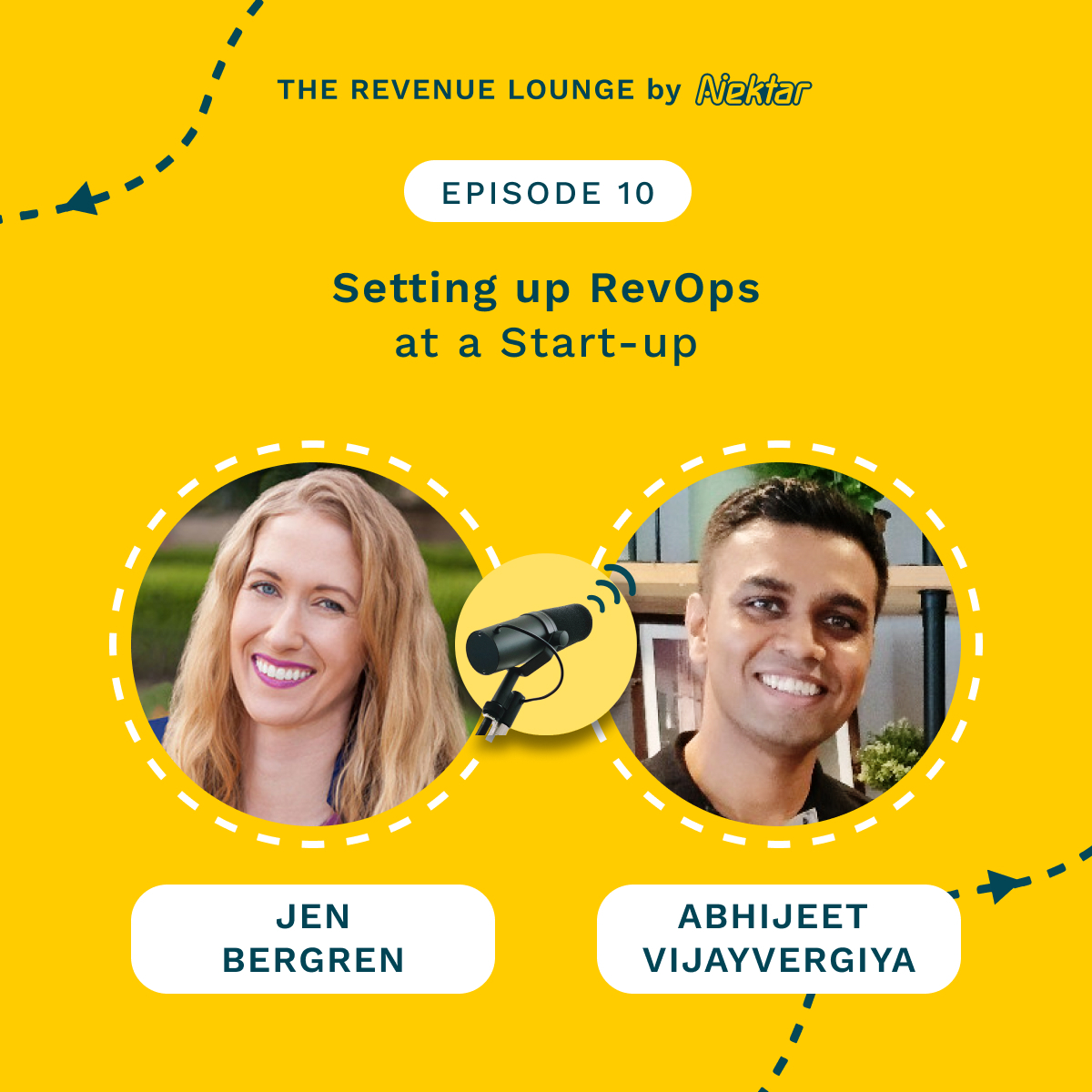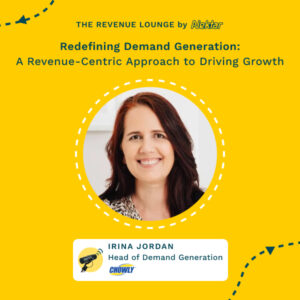Scaling GTM Teams with Data-Driven Insights and Inclusive Leadership ft. Barbara Merola Pawar
January 8, 2025

About
The Revenue Lounge
The podcast covers stories from leaders across RevOps, Sales, Customer Success, GTM, Data and Marketing about what drives these functions and what advice they would share with our listeners. With 3 seasons recorded, the podcast currently features 50+ enterprise leaders in the B2B SaaS domain. Tune in to hear from the best in the business
- Reps often dislike administrative tasks like updating CRM.
- Data accuracy is essential for effective business planning.
- AI tools can significantly reduce the time spent on administrative tasks.
- Sales leaders should focus on coaching their teams rather than just data.
- Understanding data trends is crucial for sales leaders.
- Many lost deals are due to inaction rather than competition.
- Diversity in hiring leads to better team performance.
- Inclusivity fosters a culture of psychological safety.
- Diverse teams bring a variety of perspectives and ideas.
- Building relationships across the business is key for sales success.

Scaling go to market teams in today’s enterprise landscape is no small feat. The challenges are multifaceted, ranging from aligning diverse teams with customer centric growth strategies to leveraging data for smarter, faster decision making. Hi, uh, everyone, welcome to the Revenue Lounge podcast. I am your host Randy Leykis and in today’s episode we will explore how a data driven approach combined with inclusive leadership can transform go to market strategies into sustainable frameworks.
And joining me today is Barbara Pavar. Barbara is the VP of Sales and go to market for the Northeast region at Avanade. She is a strategic growth executive with 20 years track record for leading and motivating teams to outperform their numbers and break down barriers in highly competitive markets.
Prior to Avanade, Barbara led the North American Business Averaday, a, uh, Series D SaaS startup. Barbara, thank you so much for joining us today.
Thanks so much for having me, Randy. Excited to be here.
Yeah, I’m looking forward to it as well. So I usually like to start these episodes with just maybe you can walk us through a little bit about your background, your career journey and your current role at Evident.
Sure. I started my career in politics and had a huge passion for public service and started my career in Washington D.C. and worked in the White House under the Bush 43 administration and worked as a lobbyist. And what was really exciting about being a lobbyist is the influencing and the impact that I could have on a company.
And I wanted to translate that into sales. And sales was a career that I saw that I could make an impact on a business and I could do that from geographies other than Washington D.C. and so I worked at Bloomberg and the way I was able to make the transition, and this is advice for anyone that’s looking to make a career transition is I had to translate lobbying into sales and dictate how my skills in lobbying will translate into sales.
And so Bloomberg was launching a product for lobbyists and anyone that impacts and influences the government, taking what Bloomberg does best, cleansing data and using that to enable their clients to make better decisions with how they influence and sell to the government. So I was part of the startup team, uh, and one of the first salespeople there and then moved my way up to being a sales manager and just really loved Bloomberg and took on different roles.
Bloomberg moved to New York, uh, with Bloomberg and also worked at Gartner, Best in class, uh, technology and business intelligence, and then spent four and a half years at Amazon and had many different roles there and led different sales teams, uh, focused on Mid market and enterprise across many different industries and learned so much from the people that I worked with there.
And I wanted to take everything I learned from these large enterprises and apply it to a startup. So I went to Adverity Ah and worked with Adverity ah through a time of significant change and growth and that was really exciting. And then came to Avanade, an Accenture and Microsoft company two years ago to lead sales for their northeast business.
And just recently took on a new role on Monday leading nationwide our Accenture Microsoft business Group sales for Avanade. So really excited about that opportunity and starting to meet my team and just really energized with what we have in front of us.
That’s fantastic. Congratulations.
Thank you.
I know you’re a sales leader at heart, as am I, but you also have go to market as part of your role or title. And so I’m curious, do you own or operate other aspects of go to Market beyond sales? Be like marketing, delivery channel, like that, some of those other functions as well.
So in my purview now it’s sales operations, all of the sales support that goes into selling. When I talk about go to market, it’s the fact that I am responsible as a sales leader and my company holds me accountable for the go to market strategy for the business. There is a lot of partnership that I have with my colleagues because it’s not just sales that’s setting the go to market strategy.
It is a collective unit and we rely on the talent as a consulting company of our delivery teams to really be the eyes and ears of the business because they have the front seat to the clients and the market and they’re really helping us and educating us, dictating what the market is expecting.
But it really is sales that’s held accountable for making sure that we’re executing on that go to market strategy that we’re collaborating with our colleagues on. And so that’s part of the responsibility of the sales leader and I think the responsibility of the sales leader in many different organizations.
Yeah, absolutely. Uh, okay, so your team is responsible for selling really large, you know, technology, digital transformation and consulting services. Right. And these are complex deals, large stakeholder groups, I would suspect probably pretty long sales cycles. And I think the individual contributor, the bde, acts probably pretty much as a quarterback where they own the deal.
Right. But they’re bringing in internal product specialists, subject matter experts, their uh, executives, whatever it might be. And as such, I would imagine your buying committees are pretty large. Right? Uh, probably 20 plus people. I’m imagining Especially if you’re selling at a C level and they’re bringing in people underneath them.
So each one of those people comes to the opportunities with different perspectives, different urgency, competing priorities. Right. So I think a big challenge right now is many different companies, but especially, I would suspect, in your solutions is aligning those big committees. Right. And I heard you say on a prior podcast that, you know, it’s really incumbent upon the rep to make sure that they can align to a business priority, uh, and not the technology.
Right. Maybe Talk to me a little bit about that. What do your deals kind of look like? How long are the sales cycles? Am I accurate in that assumption, or please correct me if I’m wrong.
Yeah, the importance of selling, because companies are complex, and as you mentioned, there’s many different stakeholders. They’re not looking to buy a technology or a solution. They’re looking for how do we transform our business, how do we work smarter, how do we work faster, and how do we do it most effectively with the talent that we have?
How do we reach more customers? How do we improve our revenue, our market share, whatever that is? So that is a business priority. And all of the work that we do is tying to that business priority. And so what a seller is doing in that sense is that they are taking their colleagues who have the industry expertise, the expertise on how we’ve done a similar solution in a different client, and they are working together with the client on how we’re going to align to that business priority.
Because if we solve that business priority, the technology is going to be a conduit to solve that problem. And sometimes when we lead too much with solutions, it’s harder to connect the dots with, how is this going to solve my business challenge where I need to grow double digits in the next year?
And there’s many different metrics that a company may have that they need to meet while making sure that they’re doing that more efficiently than they did the previous year. And so really understanding how the business wants to run and how they want to transform, and what is the plan for their revenue, how they’re going to close the gap, how they’re going to reach new customers, how they’re going to do it more efficiently, they’re looking for those insights from, um, companies like Avadon and Accenture and Microsoft to guide them.
And then the technology is just an answer.
Yeah, 100%. I love the example you had given, which is like, nobody ever wants to buy a CRM. They’re buying better visibility into their business. They’re buying more efficiency, right? Yeah, 100%.
Okay, so Barbara, I’ve been a seller my entire career and one thing I know that is common is that reps hate to do the administrative work of updating CRM, not just with updating the forecast, but all of the data capture for relevant stakeholders that can come in and out of a deal.
But that information is so important for marketing, right? For marketing to have that data so they can nurture, retarget, help the rep accelerate deals. What’s been your experience as far as working with your reps to make sure that you’re capturing the right data that you can help that helps the entire organization use more of a data driven approach to their business?
That’s such a great question. And the data accuracy is not only for marketing, but also for finance. If the data in the CRM is not accurate, then it’s challenging for finance to business plan and understand where we need to hire and how much we’re going to grow and where we need to make investments in the business.
So it is critically important. But like you said, and I remember when I was a seller and I felt like all I was doing was updating CRM or Salesforce or HubSpot and it was an administrative burden, especially when you didn’t have remote access and you’re traveling and you’re on the road going to clients.
And what I found that’s been really helpful is now as a uh, Microsoft business, we have Copilot and Copilot and other tools have been extremely helpful in saving sellers time and enabling sellers to focus on their business. And I also have a colleague, she was my uh, skip level manager when I was at Amazon.
Jennifer Mul. She’s creating AI for sales leaders to be able to quickly compile all of their sales data and finance data to make better decisions and to also prepare in a few minutes what used to take us a half day for business reviews. So there’s a lot of really exciting technology that’s available to us and what we are introducing to our clients that enables us to be more efficient.
And at Avanade, we call that technology as a teammate. It’s not replacing what we’re doing. It’s enabling us to move a lot faster and it’s enabling our sellers to leverage AI to take that administrative burden away. Away.
Yeah. And so as a sales leader, uh, who’s um, responsible for, you know, an overall number? How are you using data to help drive deal inspection or accurate forecast? Are you leveraging AI for that? Is it more, you know, traditional medic med pick type of framework? Just Curious to see how you’re leveraging data as a leader to manage your business.
Yeah, and I like to think of a sales leader as uh, someone who is spending the time coaching the team. And I’ve made mistakes in roles, especially early on where I’ve focused so much on the data. And I think it’s really important as a sales leader to spend a lot of time with the team and spend a lot of time in the business at clients because then you’re going to organically know what is going on with your deals.
When you have a large headcount and have close to 100 people, when you have a huge sales budget, it makes it so much harder to understand the nuances of all of the deals. But that’s where you rely on the leadership team to really reinforce the importance of accurate data and then spending time with the team and really understanding how you can help support them on certain deals.
What are some blockers that can be removed to drive deals forward? Maybe it’s that, and this is an example of a recent deal. A deal had a new executive sponsor on the client side and the uh, account executive wanted me as the executive sponsor to build that connection with the new executive sponsor on the client side.
Maybe it’s as simple as that. And providing that opportunity for me to connect with that exec on the client side and help drive the deal forward, debrief her. And so that’s going to help the sales leader provide the context around the data that they’re looking at. Other things that I think is really important for data and sales leadership is every morning looking at your dashboard and understanding where is the forecast, is it growing week over week, where is it growing?
Some of the things that uh, I like when SalesOps does is provide a report of where are the industries and the teams that are growing pipeline week over week, where’s pipeline contracting and understanding where there may be more support needed. Also making sure that you have that 3x pipeline and the pipeline’s 300% of your quota.
And so those are things that are important and it’s important for a sales leader to understand where they are at any given time and be able to understand how to read those dashboards and interpret that data. Not only because your boss is going to ask you and you have to have those real time answers, but when you’re preparing for business reviews, it’s helpful to have the context of the week over week, month over month trends so that if you’re looking at the data on a regular basis and it’s part of your routine every morning.
You understand the trends because you’ve been watching them on a regular basis. And then you can speak more eloquently to why certain industries may be growing in pipeline month over month and where there may be some support needs needed and vice versa. And so I think the most important thing with data is being able to understand it and know what metrics are important not only for the sales team, but what’s important to your boss.
Because as example, very, very real example, if you are a frontline sales leader, you have a sales target for your team, but you may not have a cost of sale target or cost of goods sold target that may be owned by your boss. And so a frontline sales leader may prefer to hire a lot of people and give them smaller targets and create a lot of sales support functions, but that’s not driving efficiency in the cost of sale.
But if you’re a frontline sales leader and you don’t have that metric, you may not be thinking about it. So the data is not only the data on your metrics, but how’s your boss metric? And so thinking that way will help when you have to present data on the health of the business.
Yeah, I think that’s really insightful and so important. And I think that I want to drill into a little bit about what you said around, you know, how maybe an IC thinks about their business and how a frontline sales manager then manages, takes that data and manages it up to their boss or their boss’s boss, the executives.
And I think it’s different. Right. When you’re a sales leader, either frontline sales manager or above, you have an accountability to the business that you don’t necessarily have so much as an ic. Can you talk a little bit about that? How does the stresses or the pressures differ for somebody who has a team underneath them and you’re responsible for a bigger book of business.
How’s that different than from when someone is, uh, an ic?
And that’s a really amazing pivot in someone’s career and something that I remember really well, because when I was an ic, you’re only thinking about your business. You only have a certain number of accounts, and so you can outperform to an extent, but you’re making a contribution to the business that is very critical and you can control what you do, and you have such a powerful role in the sense that you’re closest to the client and you have all of the insights in what, uh, the client is doing, how they’re going to grow, how they need support, how you can partner with them.
When you transition to a sales manager you’re kind of a step away from that. So that there is that transition. Especially for sales managers that got promoted because they were high performing sellers and they’re high performing sellers because they love being in the field. And when you’re not as much in the field it can be that transition.
But the best sales managers are spending as much time in the field with their people. How it’s different is that first psychologically you have to consider that you’re not going to be able to control everything and you’re going to depend on your team to be able to deliver the number and be successful.
What a lot of frontline sales managers do, especially again if they were promoted from being a high performing seller, is that they may teach and coach their team to sell how they sold mhm. But there’s many, many ways to be successful as a seller. The best sales organizations have a sales methodology that they follow.
And a lot of us use Medic or Challenger Sale or Sandler, whatever it is. And that’s great, have that framework. But the personality and uh, the customization that each seller deploys in that methodology is very unique. And there is an art to selling. And so sometimes being a first time frontline sales manager, it’s a lot about learning about your sellers, how they’re motivated and really understanding what has made them successful.
Because what makes them successful may be different than what made the sales manager successful as an ic. And the other piece is about data. And there’s a new sales manager that I work with and he said something really funny. He said, when I was an ic, I was so busy selling that I didn’t always think about the data.
He’s like, now that I’m a sales manager, it’s funny because I worry about the data and I wonder why it’s not 100% accurate all the time. And it’s because sellers are busy and they’re not thinking about the CRM. They’re thinking about, uh, how am I going to provide value to my client today?
Yeah.
So it was just funny to have that conversation because it is a big transition for those sales managers and it’s up to their manager. So now I work with my sales managers in coaching them to, like I said before, how uh, is your team motivated? How is each person unique in their success and how can you accelerate and get more out of each person?
And finally, how do you lead everyone differently? Because there are some people like top performers, all they need you to do is be there if there’s an issue and they need you and they need you to remove blockers or they need you to get involved in a deal. And then there may be others that need or want more support.
And so it’s really understanding that there is no cookie cutter way for each seller, even if they’re in the same role.
Yeah, you mentioned something just uh, a minute ago about sometimes you don’t have perfect data. And we talked about like the sellers not wanting to do it, but it’s so important to like again going back to like the larger buying committees and the different stakeholders. A lot of times you’re working deals that for whatever reason they didn’t come together, um, and they close, lost them.
They didn’t close off them because you lost it to a competitor. It’s just the company, you couldn’t get alignment on the problem and you didn’t want the seller to spend any more time on it. They wanted to go chase deals that you can win. Yet there’s so much from that engagement and the different people that have come into it that typically is locked up.
It’s locked up in the meeting invites, in uh, the email exchanges and everything else. But the rep doesn’t think about that. But you as a leader think about this overall book of business and being able to work with your internal partners with marketing to put these people in a nurture campaigns and things like that.
So it’s amazing to me how many companies realize they don’t have complete data, but you still got to make decisions off of that. Right. And with what you have, it’s so true.
And that’s why it’s important to have opportunities for loss reviews and to do reviews on the data. So what we do is review the lost deals. And what you’re saying is so accurate. Over 50% of lost deals is not to a competitor. It’s just to the deal going cold and in action.
And it’s important to do a review of those deals. And you’re inviting marketing to that and you’re inviting your stakeholders to understand what went really well, that we can document, what are some learnings that we have that we’d like to implement going forward and what is a plan that we see that we can probably go after this deal again in the future.
So those loss reviews are important and doing them as soon as you close out the deal and the information is fresh in everyone’s mind. But I can’t stress enough the importance of the tools that are available now for sellers, especially tools like Copilot and other AI tools that is going to enable sellers and decision makers to have access to disparate data.
And it’s also so critical, especially with roles being transient and people moving into promotions and people moving into different roles and companies restructuring to provide more opportunities for people. Accounts get moved. And there’s an importance for having that intellectual property.
Yeah.
And having it, um, in a place where it’s one central location. Everyone in the business has access to it. Not everyone in the business, but everyone that needs to have the data has access to it because it is critically important. And data is where you get the insights to make better decisions in the future.
Yeah. I had a conversation with, uh, strategic sales leader at a, at a security company not too long ago and he brought up a really interesting point and he said our deals, you know, are long. Sometimes we might get in there after a deal was already signed and so it might not be three years until we have another opportunity.
But you think about all the turnover that happens. I think 30, 30% of an organization, you know, 30% of employees turn at an organization and you spend so much time, you know, trying to get knowledge on an account and books move, people leave and all this human capital that you’ve invested into the business to try to understand like goes away, at least historically it has.
And I think that’s what’s really exciting about a lot of the tech in the AI that’s coming to market right now is being able to harvest that and put them into places so that we are not wasting that capital or that knowledge and being able to apply it moving forward.
So I thought that was a really interesting insight and conversation because it’s so true.
Absolutely. And that data has always been there. It’s just we weren’t leveraging it. And sellers were not always required to put detailed notes in. And I’ve worked at companies where you had to put in detailed notes for every call that you had. And some sellers were more detailed than others, but that’s not the case across the board.
And then what are the insights that you can glean from that data? And that is new. And the technologies that is quickly going to take all of this disparate data and enable you very quickly to not just consolidate it because again that’s not new, that’s not and interesting. But what is really exciting is being able to quickly get insights.
And it’s a way to educate and excite people that aren’t as data passionate to use these tools, get really excited about the data that they’re seeing and the insights that they’re receiving and then thinking, oh, what other insights can I glean from this? And I think that’s what’s really powerful is just the fact that these technologies are enabling us to get uh, insights to excite those that weren’t really passionate about it before.
And now they’re able to really get excited and have robust discussions with their colleagues and make decisions on where to make investments. And I think that’s really great.
Yeah, think about for a large organization like yourself. So you’ve got hundreds of opportunities you have over the course of a year and think about when the, if you look at close one deals, you look at the different Personas or stakeholders that were engaged, when did they get engaged, how engaged were they?
And to be able to look like, run the analysis and look for the patterns in the data. Right. And then once you have those insights, then take a look at your closed loss deals and look for the anomalies of those patterns and then apply it to your current book of business.
I just think it’s a very exciting time right now to be in sales, to be a sales leader and to think about how this technology is, I think, is going to drive the business, uh, differently than it was in the past.
Agreed. And the only way that it’s going to be insightful is having that foundation of accurate data. And so everything that we’re talking about, it’s interesting how it goes back to the data, because if the data foundation is accurate and clean, then it’s going to make the insights that much more powerful and relevant.
Yeah. So let’s pivot a little bit and talk about. Because we talked a little bit in the green room about the idea of. I, um, want to ask you, why is inclusivity essential when building high performance sales teams? And what actionable steps can sales leaders take to foster diversity and collaboration in enterprise environments?
I love this question because a lot of times we get our best hires from referrals and that’s really exciting. And it’s such a compliment when your colleagues love the company so much that they want to recommend colleagues and friends to work with you. In addition to that, it’s critically important to ensure that roles are posted, that roles are posted internally.
Internally, externally, that people have the opportunity to apply for the roles. And it’s also important to ensure diversity in many different ways. So you want racial diversity, gender diversity, diversity of thought, diversity by region. And what’s really nice is that there’s opportunity to hire people near offices, and that’s great.
And you want to have that if there’s a hybrid environment, but also leaving an opportunity for people who may not be in those geographies. Having that diversity across region is really important too, because it just expands the geography and the people that you’d be able to hire. Also with hiring, because we mentioned hiring, I think it’s critically important to have diverse hiring loops.
And one of the things that we implemented at Amazon Business when I was there is ensuring we have at least, uh, one woman and one professional, uh, of color on all of our interview loops. Because you want to make sure that the interview loops are diverse and it reflects the team environment that they’re going to go into.
Have interviewed for roles and interviewed for many different roles where I did not meet one woman during the process until I got to the last step and HR was a woman and that was it. And you want to reflect the team. So you have to be honest about the fact that the team that you have may not be diverse, and that’s why you are interviewing, um, to increase more diversity.
But it’s critically important to ensure that you are creating diversity in every level of the organization. And new hires can see that they’re joining an organization that is already diverse. No one wants to be the first woman on the team or the first person of color on the team.
Whereas I would assume no one wants to be the first man on a team that’s all women. And so that first step is a challenge, but critically important because it just sets the tone for the rest of everything that you do. And then the final piece is that it’s not just about creating diversity.
The word you specifically used is inclusivity. And it’s not just about diversity. Because when we talk about diversity, equity and inclusion, diversity is just the first piece you want to have that a lot of times companies stop there and they check the box that they have a diverse team, want people to feel included, and ensuring that there’s unconscious bias training.
And all leaders in my business at, uh, Amazon Business, we all had to go through unconscious bias training. It’s creating psychological safety in a safe place so that if something is said, if there is a transgression, if there’s something that is inappropriate, if there’s an Opportunity to educate somebody.
Then the team feels comfortable speaking up and saying something and kindly educating each other. I think that’s a, A huge part of inclusivity is creating a culture where people feel safe teaching each other when there’s an opportunity for that coaching. And finally, because we’ve been talking about leadership, is just leading by example and making sure that we are creating the culture that we want to be part of and setting the tone for the inclusivity of the team.
That is so critically important. And there’s so m many statistics around diverse teams are the most performing. And it’s so true. You’re not going to grow if you do something the same way all the time. In this economy, we all have to get creative and we’re not going to be creative if we don’t have that diversity of thought.
And diversity of thought comes from having economic, racial, gender, geodiversity. So it is critically important. And it starts with sales because sales is the face of the company.
Yeah.
And really should be thought leaders in this space.
Yeah. I think one of the, I don’t want to call it a benefit of the COVID era because there was not really benefit. But the fact that no one is confined to specific offices like you can. You. You expanded the geographic reach of where people can work. And I think that has done unintentionally.
It’s just a byproduct of, of building out diversity. Right. I think about our company. We’re 100 remote company. I work with people in India, I work with people in Singapore. I work with people in uae. Like it’s just it, it, it, it and we have it. It does promote just such a great working, uh, environment to have that sort of diversity of thought in perspective.
Exactly. And you learn so much from people that are not in your geography and people that you haven’t had the opportunity to work with in the past. Uh, but I also do like environments where you’re in the office and it is hybrid and you have the opportunity to be in person with people and build those connections.
Because I also think that helps with inclusion as well.
Yeah.
People feel more connected to people that they know and it’s easier to call somebody out if needed or coach them if you know that person and you had lunch with that person and you see them every Tuesday in the office. It’s just that much easier to build those connections with people because they’re your work friends, you know, they’re not just your colleagues.
And I also think on the flip side can also help drive inclusivity Yeah, a hundred percent.
So I want to be conscious of time, but I also want to go back to something you said at the very beginning, which was your new role. What are you most excited about in your new role?
What I’m most excited about is all of the people I’m meeting and just how passionate everyone is and excited. It’s a really exciting time in the business, in the industry as we’ve been talking about with all the AI technologies. So just how, how excited and leaned in the team is.
That’s my favorite part.
Yeah, that’s wonderful. So let’s pivot to what we call a lightning round, which is just a little bit more fun, a, uh, little bit more personal. So I was looking at your LinkedIn profile and the one thing I saw is that you are an avid traveler. Uh, I think you’ve been to 40 plus countries.
Right. So my question for you is what has been the most exotic or unique place that you’ve been to? And that may or not be your favorite. Right. So I guess the second question of that would be which, which country was your favorite?
The most exotic place I’ve been to that was really different. I would say maybe Tanzania or Cambodia. My favorite. I love New Zealand. I love Argentina and Italy because I have family there. And Tanzania is always gonna be one of my favorites because that’s where we went on our honeymoon.
Yeah, those would probably be my top five.
Yeah, that’s great. And I’ve never been to one of those. The closest I’ve been is Australia. I’ve never been to any of Australia too. Yeah, great, Great. I know you’re new your role, but as a sales leader for the past several years, what’s the favorite part of your job?
My favorite part is working with sellers on deals and just seeing the results of their wins. It’s so exciting to watch and I’m learning from them every day.
Yeah. Now there’s a flip side to that question. Which is what’s the least favorite or a different way to ask the question might be, um, what’s really hard about your job?
Sometimes it can be challenging in this to accurately reflect the business and also have the accuracy with what I’m doing with the team.
Last question. So you work with a lot of ICs, very successful. A lot of people like to stay as an IC their entire career. Some people want to get into leadership. What advice would you give to someone who is considering getting into leadership and management? What are the trade offs of getting into leadership as opposed to staying as an IC?
Well, we talked about earlier, just ICs love having the control over their pay, their time. It’s not your own anymore when you’re a sales manager, but it’s so much more rewarding when you can see the success in your team. My piece of advice to really big things, build relationships.
Make sure that you have sponsors, people that know what you’re doing. And build relationships across the business, not just with senior sales leaders, but sales is there for the rest of the business to ensure that we’re able to continue to deliver great delivery to clients and sell great products is through selling.
And so building relationships across the business is important. And secondly, start doing the job. Start coaching and taking on ICs that you can work with to demonstrate that you are a coach and that you can replicate your success with others. And others see value in your coaching and they’ve impact their clients through that.
So that would be my biggest piece of advice.
Yeah, great advice. Well, Barbara, again, I won’t be cautious of time. I just want to say thank you. This has been a really great, uh, conversation. Congratulations again, ah, on your role. And that’s a wrap for another episode of the Revenue Lounge. Thanks everyone for listening. Have a great weekend.
Thanks, Randy. Bye everyone.

Ep #1: Navigating the Downturn with a Hyperfocus on Productivity
Listen Now
Ep #2: How to Win in Times of Uncertainty
Listen Now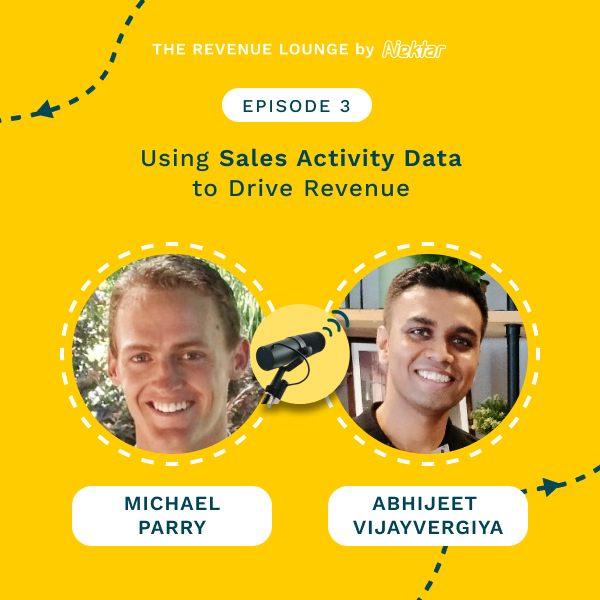
Ep #3: Using Activity Data to Drive Sales Productivity
Listen Now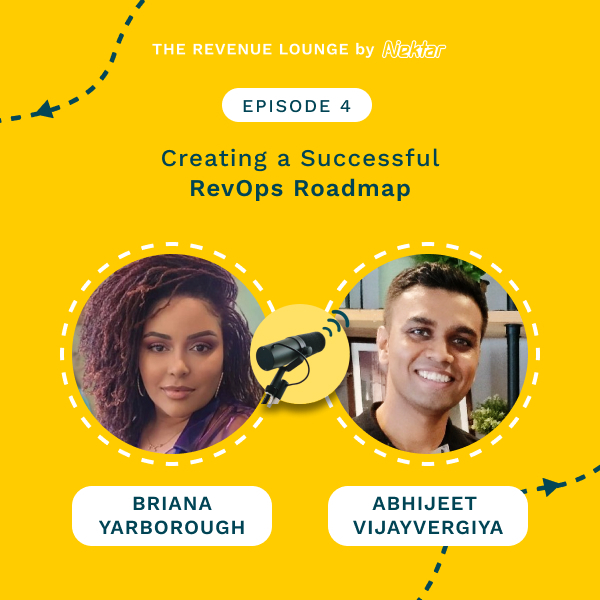
Ep #4: Creating a Successful RevOps Roadmap
Listen Now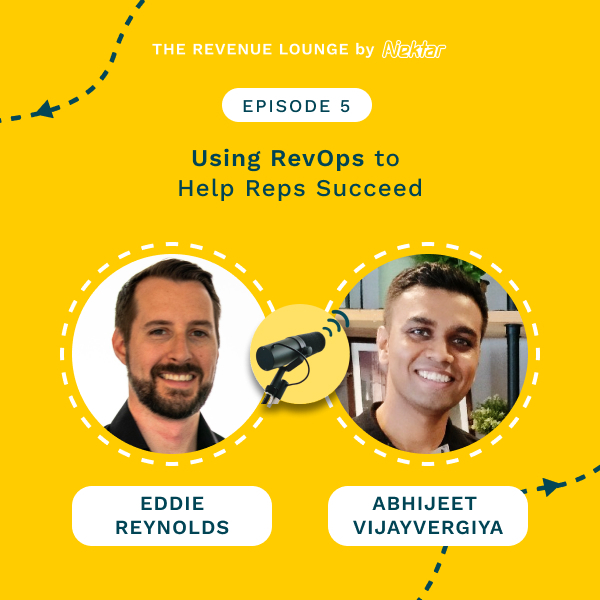
Ep #5: Using RevOps to Help Reps Succeed
Listen Now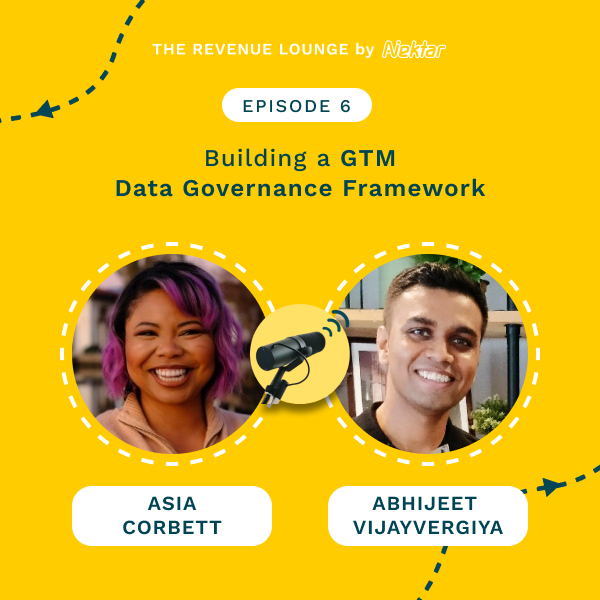
Ep #6: Building a GTM Data Governance Framework
Listen Now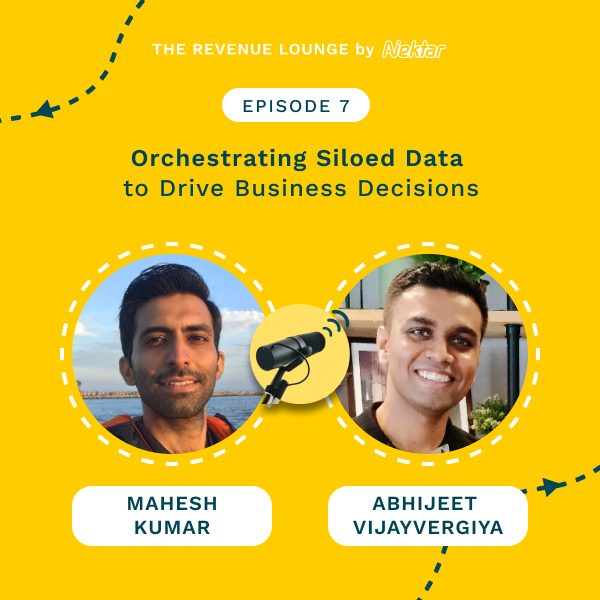
Ep #7: Orchestrating Siloed Data to Drive Business Decisions
Listen Now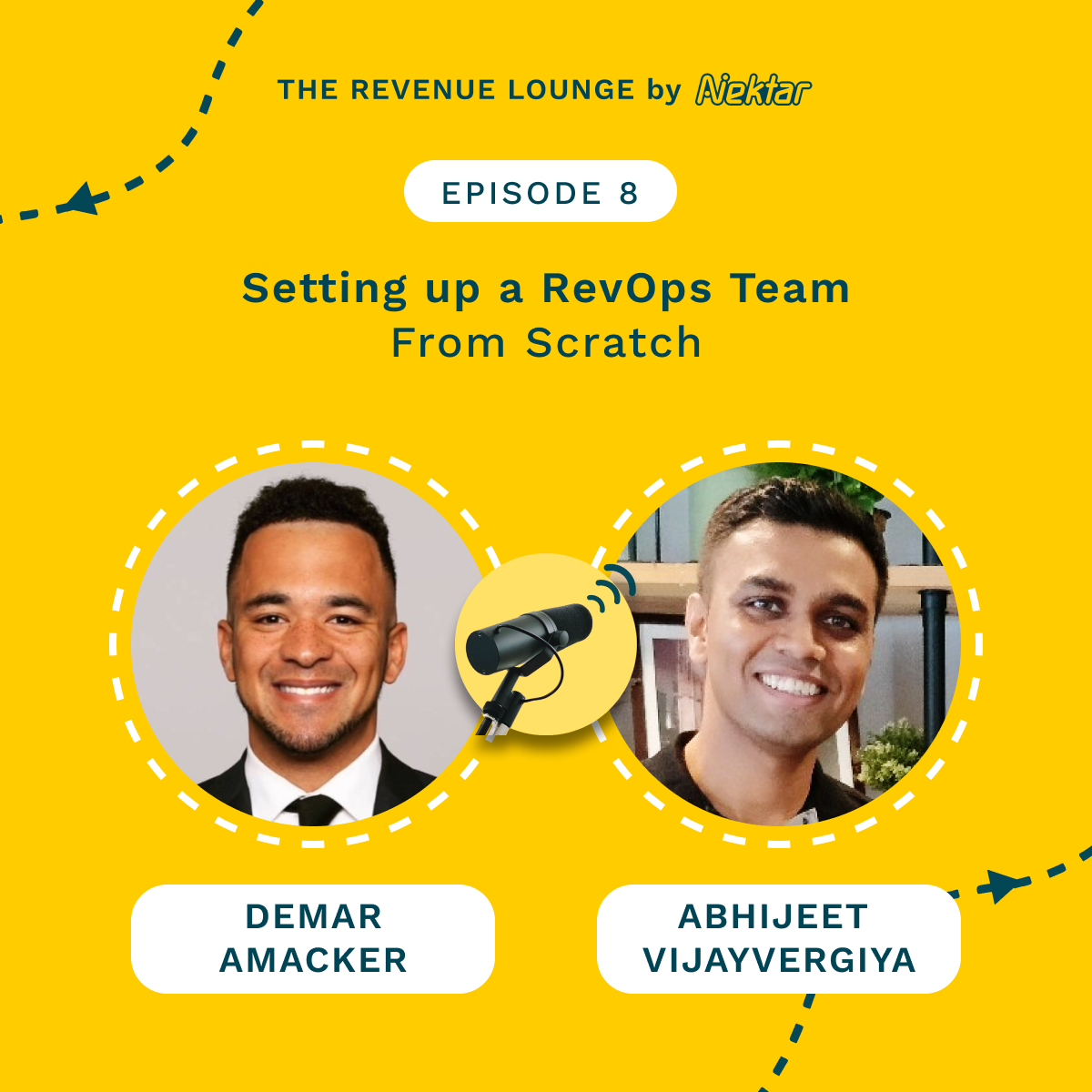
Ep #8: Setting Up a RevOps Team From Scratch
Listen Now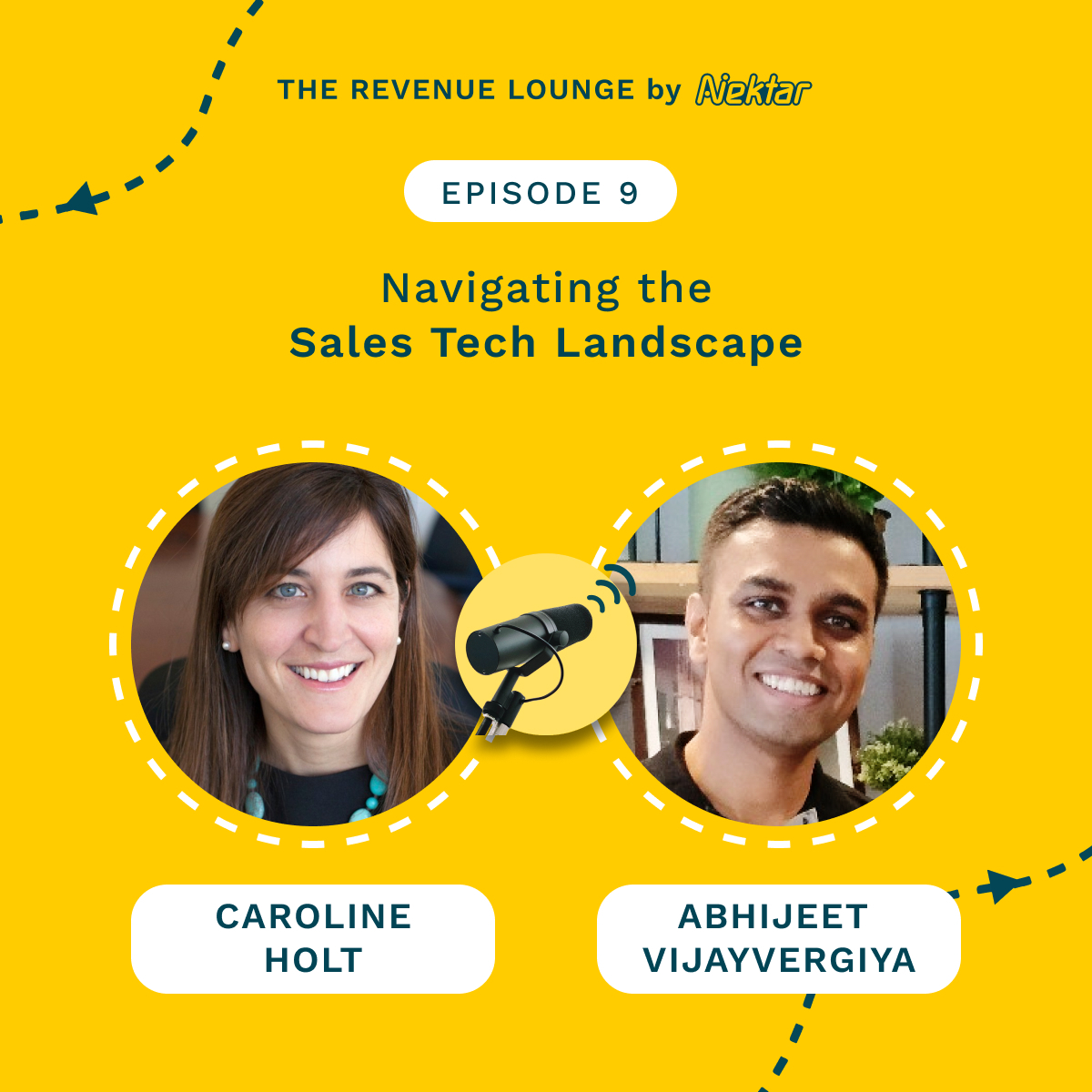
Ep #9: Navigating the Sales Tech Landscape
Listen Now